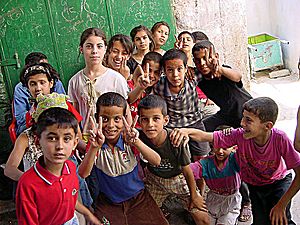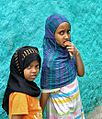Childhood facts for kids
Childhood is a special time in a person's life. It's the period that starts when you are born and lasts until you reach puberty. During childhood, you grow, learn, and discover the world around you. It's a time of amazing changes, both in your body and your mind. For many, childhood officially ends when they reach a certain age of majority, often around 18 years old, becoming an adult. Sometimes, this change is marked by a special event called a rite of passage. The word "youth" is often used to describe teenagers and young adults.
Contents
Understanding Childhood Stages
Childhood isn't just one long period; it's made up of different stages. Each stage brings new ways of learning and growing. Knowing these stages helps us understand how children develop.
Infancy: The First Year
This stage covers babies from birth to about one year old. Infants learn incredibly fast. They discover how to move their bodies, recognize faces, and make sounds. They also start to understand simple words.
Toddler Years: Exploring the World
From ages one to three, children are called toddlers. This is when they start walking and talking more. Toddlers are very curious and love to explore everything. They begin to show their independence and personality.
Preschool Years: Learning and Playing
Between ages three and five, children enter the preschool stage. They become better at talking and playing with others. This is a time for imaginative play and learning basic skills like counting and identifying colors. Many children attend preschool to prepare for school.
School Age: Growing and Socializing
From about six to twelve years old, children are in their school-age years. They spend a lot of time learning in school and making friends. They develop important skills like reading, writing, and problem-solving. This stage is also key for building social skills and understanding rules.
Adolescence: The Path to Adulthood
Adolescence usually begins around ages 12 to 15, leading into the teenage years. This is when puberty starts, bringing many physical changes. Adolescents also experience big changes in their thinking and emotions. They start to figure out who they are and what they want to do.
Why Childhood Matters
Childhood is a very important time for every person. It lays the foundation for who you will become as an adult. Many key developments happen during these years.
Brain Development and Learning
During childhood, your brain grows and develops rapidly. This helps you learn new things every day. From walking and talking to reading and solving math problems, your brain is constantly making new connections.
Building Skills and Habits
Childhood is when you learn many important life skills. These include how to communicate, how to get along with others, and how to manage your feelings. You also start to form habits that can last a lifetime.
The Importance of Play
Playing is not just fun; it's how children learn. Through play, kids develop creativity, solve problems, and practice social skills. It helps them understand the world and express themselves.
Children's Rights Around the World
Every child, no matter where they live, has certain rights. These rights are protected by international agreements like the United Nations Convention on the Rights of the Child.
Basic Rights for Children
These rights ensure that children are safe and can grow up healthy. They include the right to:
- Have enough food and clean water.
- Receive medical care when they are sick.
- Be protected from harm and violence.
The Right to Education
Every child has the right to go to school and learn. Education helps children gain knowledge and skills. It prepares them for their future and helps them reach their full potential.
The Right to Play and Rest
Children also have the right to play and have free time. Playing is essential for their development and happiness. It allows them to relax and be creative.
Childhood Experiences Across Cultures
Childhood can look different depending on where you live in the world. Culture, family traditions, and economic situations all play a role in how children grow up.
Different Ways of Growing Up
In some parts of the world, children might have more responsibilities at a younger age. In others, they might spend more time in formal schooling. These differences show the many ways childhood can be experienced.
The Role of Family and Community
Family and community are very important in a child's life. They provide support, teach values, and help children learn about their culture. Strong communities help children feel safe and loved.
Images for kids
-
Children playing the violin in a group recital, Ithaca, New York, 2011
-
Children in Madagascar, 2011
-
Playing Children, by Song Dynasty Chinese artist Su Hanchen, c. 1150 AD.
-
Children play in the fountain in a summer evening, Davis, California.
-
Dancing at Mother of Peace AIDs orphanage, Zimbabwe
-
Ralph Hedley, The Tournament, 1898. It depicts poorer boys playing outdoors in a rural part of the Northeast of England
See also
 In Spanish: Infancia para niños
In Spanish: Infancia para niños
 | Victor J. Glover |
 | Yvonne Cagle |
 | Jeanette Epps |
 | Bernard A. Harris Jr. |


















